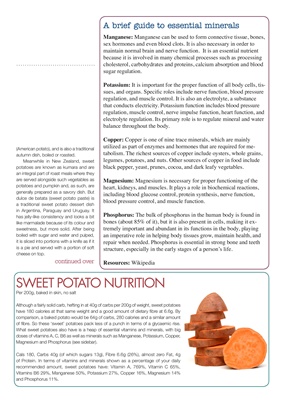
KITLIVING
Per 200g, baked in skin, no salt
Although a fairly solid carb, hefting in at 40g of carbs per 200g of weight, sweet potatoes
have 180 calories at that same weight and a good amount of dietary fibre at 6.6g. By
comparison, a baked potato would be 64g of carbs, 280 calories and a similar amount
of fibre. So these 'sweet' potatoes pack less of a punch in terms of a glycaemic rise.
What sweet potatoes also have is a heap of essential vitamins and minerals, with big
doses of vitamins A, C, B6 as well as minerals such as Manganese, Potassium, Copper,
Magnesium and Phosphorus (see sidebar).
Cals 180, Carbs 40g (of which sugars 13g), Fibre 6.6g (26%), almost zero Fat, 4g
of Protein. In terms of vitamins and minerals shown as a percentage of your daily
recommended amount, sweet potatoes have: Vitamin A, 769%, Vitamin C 65%,
Vitamins B6 29%, Manganese 50%, Potassium 27%, Copper 16%, Magnesium 14%
and Phosphorus 11%.
SWEET POTATO NUTRITION
continued over
(American potato), and is also a traditional
autumn dish, boiled or roasted.
Meanwhile in New Zealand, sweet
potatoes are known as kumara and are
an integral part of roast meals where they
are served alongside such vegetables as
potatoes and pumpkin and, as such, are
generally prepared as a savory dish. But
dulce de batata (sweet potato paste) is
a traditional sweet potato dessert dish
in Argentina, Paraguay and Uruguay. It
has jelly-like consistency and looks a bit
like marmalade because of its colour and
sweetness, but more solid. After being
boiled with sugar and water and pulped,
it is sliced into portions with a knife as if it
is a pie and served with a portion of soft
cheese on top.
A brief guide to essential minerals
Manganese: Manganese can be used to form connective tissue, bones,
sex hormones and even blood clots. It is also necessary in order to
maintain normal brain and nerve function. It is an essential nutrient
because it is involved in many chemical processes such as processing
cholesterol, carbohydrates and proteins, calcium absorption and blood
sugar regulation.
Potassium: It is important for the proper function of all body cells, tissues, and organs.
Specific roles include nerve function, blood pressure
regulation, and muscle control. It is also an electrolyte, a substance
that conducts electricity. Potassium function includes blood pressure
regulation, muscle control, nerve impulse function, heart function, and
electrolyte regulation. Its primary role is to regulate mineral and water
balance throughout the body.
Copper: Copper is one of nine trace minerals, which are mainly
utilized as part of enzymes and hormones that are required for metabolism. The
richest sources of copper include oysters, whole grains,
legumes, potatoes, and nuts. Other sources of copper in food include
black pepper, yeast, prunes, cocoa, and dark leafy vegetables.
Magnesium: Magnesium is necessary for proper functioning of the
heart, kidneys, and muscles. It plays a role in biochemical reactions,
including blood glucose control, protein synthesis, nerve function,
blood pressure control, and muscle function.
Phosphorus: The bulk of phosphorus in the human body is found in
bones (about 85% of it), but it is also present in cells, making it extremely important and abundant in its functions in the body,
playing
an imperative role in helping body tissues grow, maintain health, and
repair when needed. Phosphorus is essential in strong bone and teeth
structure, especially in the early stages of a person's life.
Resources: Wikipedia